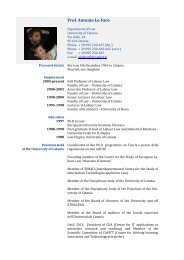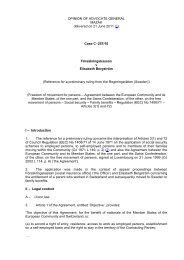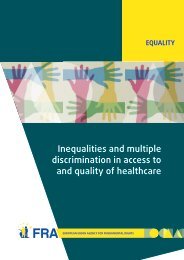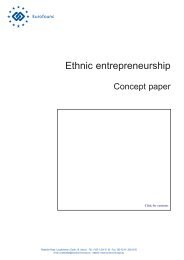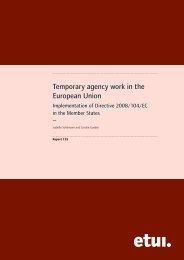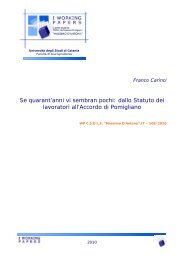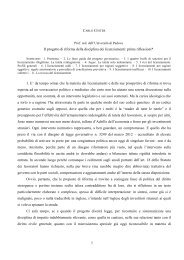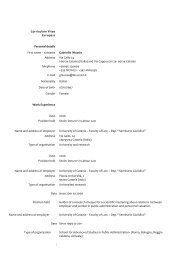Study on non-legislative initiatives for companies to promote gender ...
Study on non-legislative initiatives for companies to promote gender ...
Study on non-legislative initiatives for companies to promote gender ...
Create successful ePaper yourself
Turn your PDF publications into a flip-book with our unique Google optimized e-Paper software.
Gender equality <strong>initiatives</strong> 67<br />
<strong>gender</strong> stereotypes and creating a favourable working envir<strong>on</strong>ment and atmosphere.<br />
The successful enterprises received an audit certificate.<br />
In the Czech Republic, within EQUAL, the pilot phase of “Genderové audity” (<strong>gender</strong><br />
audits) <strong>to</strong>ok place with the aim <strong>to</strong> develop a methodology of <strong>gender</strong> auditing <strong>for</strong><br />
employers. The <strong>companies</strong> <strong>to</strong> be audited shall undergo an overall evaluati<strong>on</strong> with regard<br />
<strong>to</strong> <strong>gender</strong> equality taking in<strong>to</strong> account various issues such as recruitment, employment<br />
terminati<strong>on</strong>, male/female ratio, compensati<strong>on</strong> and benefits, career opportunities,<br />
flexible arrangements, family friendly measures, workplace atmosphere and corporate<br />
culture. The current project is being implemented in Prague. Although there is no label<br />
developed by now, the procedure gives a basis <strong>for</strong> establishing <strong>on</strong>e in the near future.<br />
Labels with a broader diversity focus<br />
Apart from labels focussing <strong>on</strong> <strong>gender</strong> equality <strong>on</strong>e label covering broader issues has<br />
been included in the analysis. The Belgian “Label Gelijkheid Diversiteit – Label Égalité<br />
Diversité” (label equality diversity) aims at the development of a corporate culture that<br />
fosters sustainable diversity management with focus <strong>on</strong> <strong>gender</strong>, age, ethnic origin, and<br />
political and religious c<strong>on</strong>victi<strong>on</strong>. As it was inspired by acti<strong>on</strong>s at European level and in<br />
neighbouring countries (such as the French equality label – see above), the label<br />
combines management and audit c<strong>on</strong>cepts and is c<strong>on</strong>ceived as a process. The<br />
organisati<strong>on</strong>s awarded with the label have <strong>to</strong> respect legislati<strong>on</strong> in the field of equality<br />
and n<strong>on</strong>-discriminati<strong>on</strong>, develop and implement a diversity strategy, involve employees<br />
in the process of analysing and planning the diversity strategy and work <strong>on</strong> c<strong>on</strong>tinuous<br />
improvement. The label is granted <strong>for</strong> a three-years-period after a committee has<br />
evaluated the applicati<strong>on</strong>.<br />
The Label Egalité Diversité/Label Gelijkheid Diversiteit (Label Equality Diversity)<br />
has been elaborated and implemented in reacti<strong>on</strong> <strong>to</strong> a report by the Belgian Committee<br />
<strong>on</strong> Intercultural Dialogue that revealed discriminati<strong>on</strong> in the fields of recruitment, salary<br />
and promoti<strong>on</strong>.<br />
There<strong>for</strong>e, the objective of the label is <strong>to</strong> facilitate the development of a corporate<br />
culture that fosters sustainable diversity in terms of <strong>gender</strong>, age, colour of skin, and<br />
political and religious c<strong>on</strong>victi<strong>on</strong>s. All types of organisati<strong>on</strong>s, public and private, small<br />
as well as large can apply <strong>for</strong> the label. In <strong>to</strong>tal, 11 fields of acti<strong>on</strong> within 3 areas are<br />
c<strong>on</strong>sidered in the labelling process that is accompanied by independent c<strong>on</strong>sultants:<br />
area 1 – pro-diversity culture of the enterprise/organisati<strong>on</strong>:<br />
• <strong>for</strong>mulate and communicate, internally and externally, the engagement of the<br />
organisati<strong>on</strong> <strong>to</strong> favour diversity and fight against discriminati<strong>on</strong>;<br />
• in<strong>for</strong>m all employees about the diversity policy;<br />
• implement a sensibilisati<strong>on</strong> programme <strong>for</strong> the employees;<br />
area 2 – pro-diversity in HR management:<br />
• elaborate hiring procedures in favour of diversity;<br />
• envisage specific recepti<strong>on</strong> procedures <strong>for</strong> new employees;<br />
• ensure equal access <strong>to</strong> training <strong>for</strong> all employees;<br />
• internal mobility: grant same possibilities <strong>to</strong> all employees, based <strong>on</strong><br />
professi<strong>on</strong>al quality and motivati<strong>on</strong>, focus <strong>on</strong> diversity in upraising procedures;<br />
• adapt working c<strong>on</strong>diti<strong>on</strong>s <strong>to</strong> allow pers<strong>on</strong>s of different target groups <strong>to</strong> per<strong>for</strong>m<br />
at their best;<br />
• analyse the reas<strong>on</strong>s <strong>for</strong> voluntary and involuntary quits;




